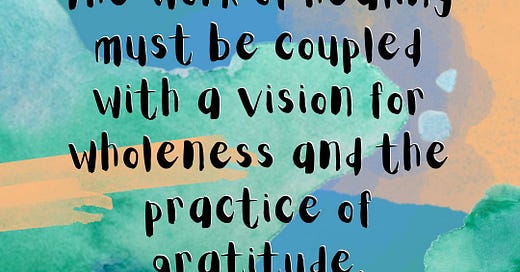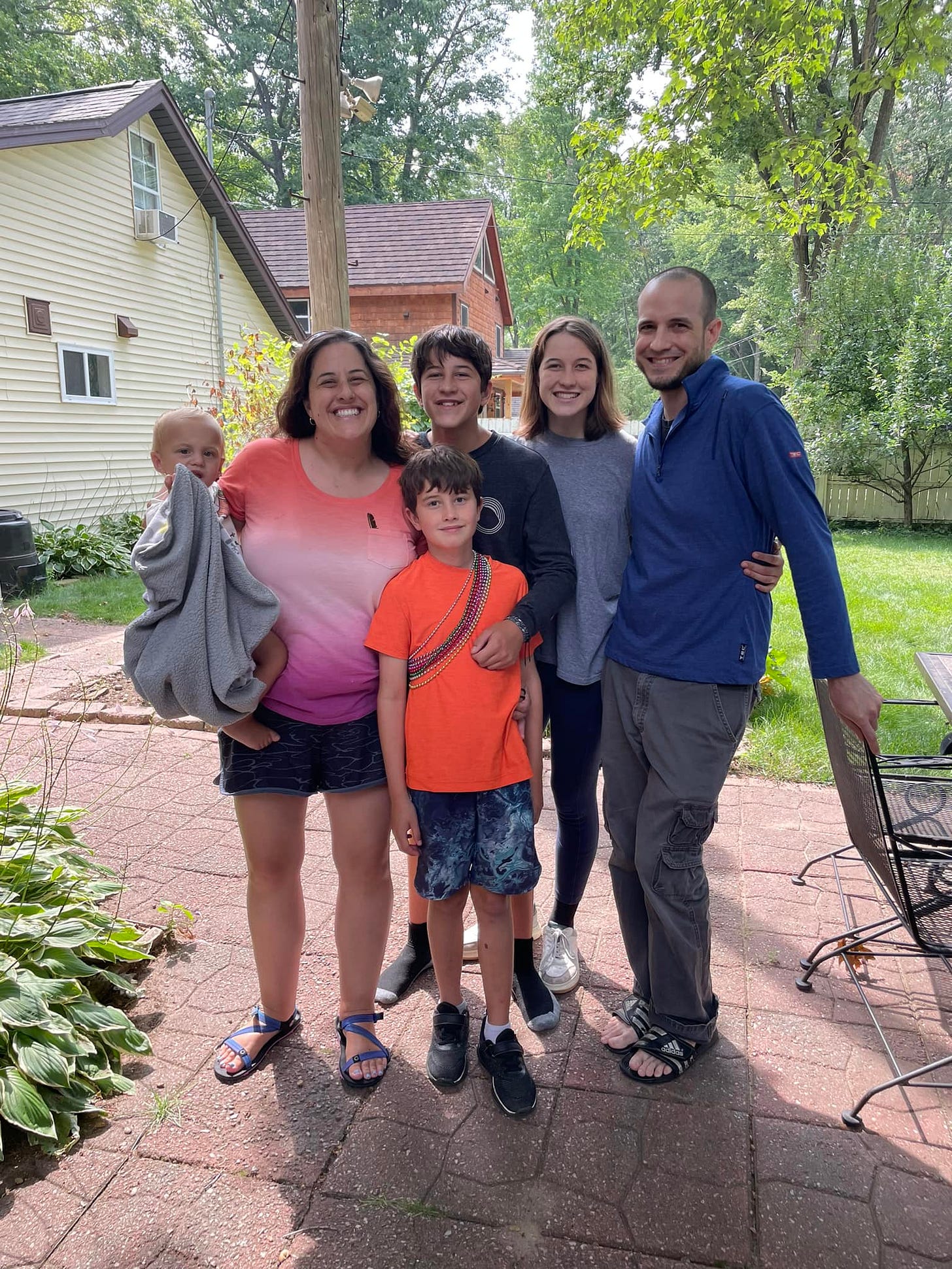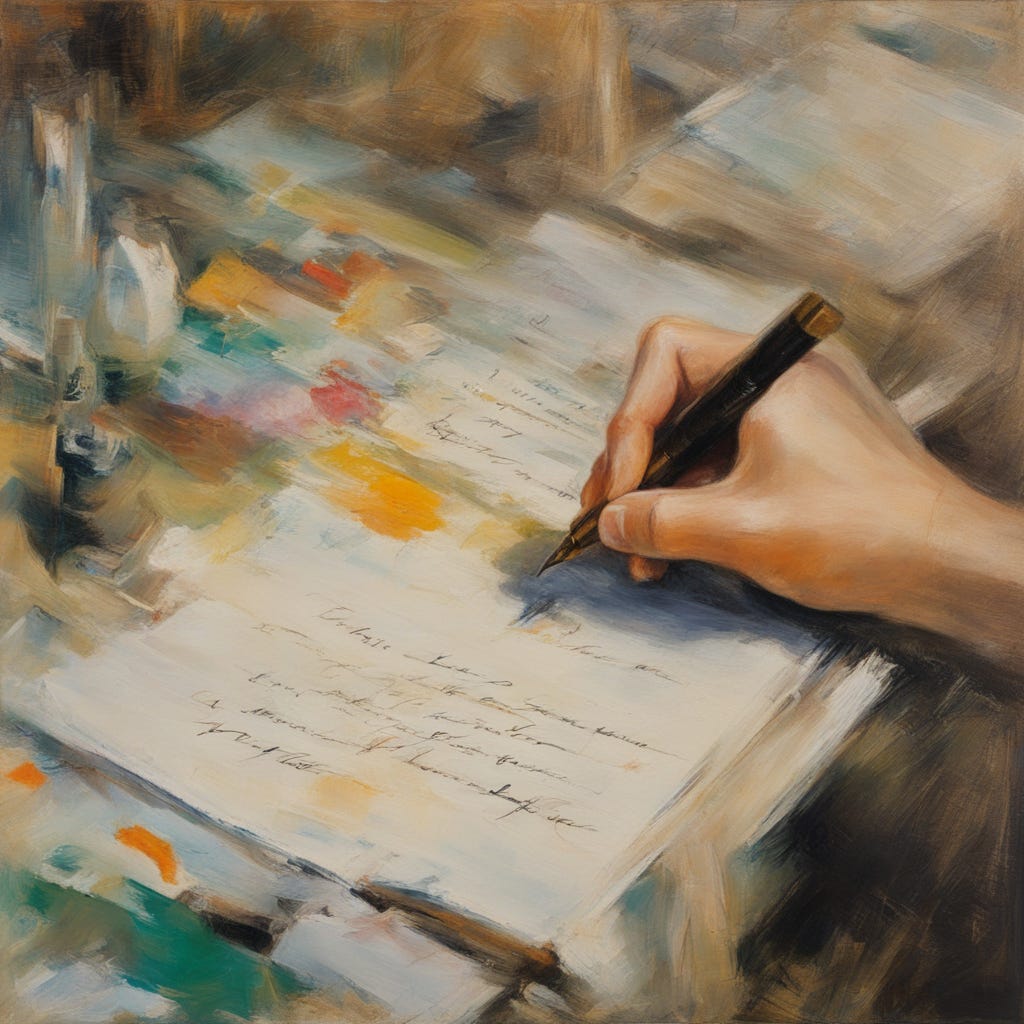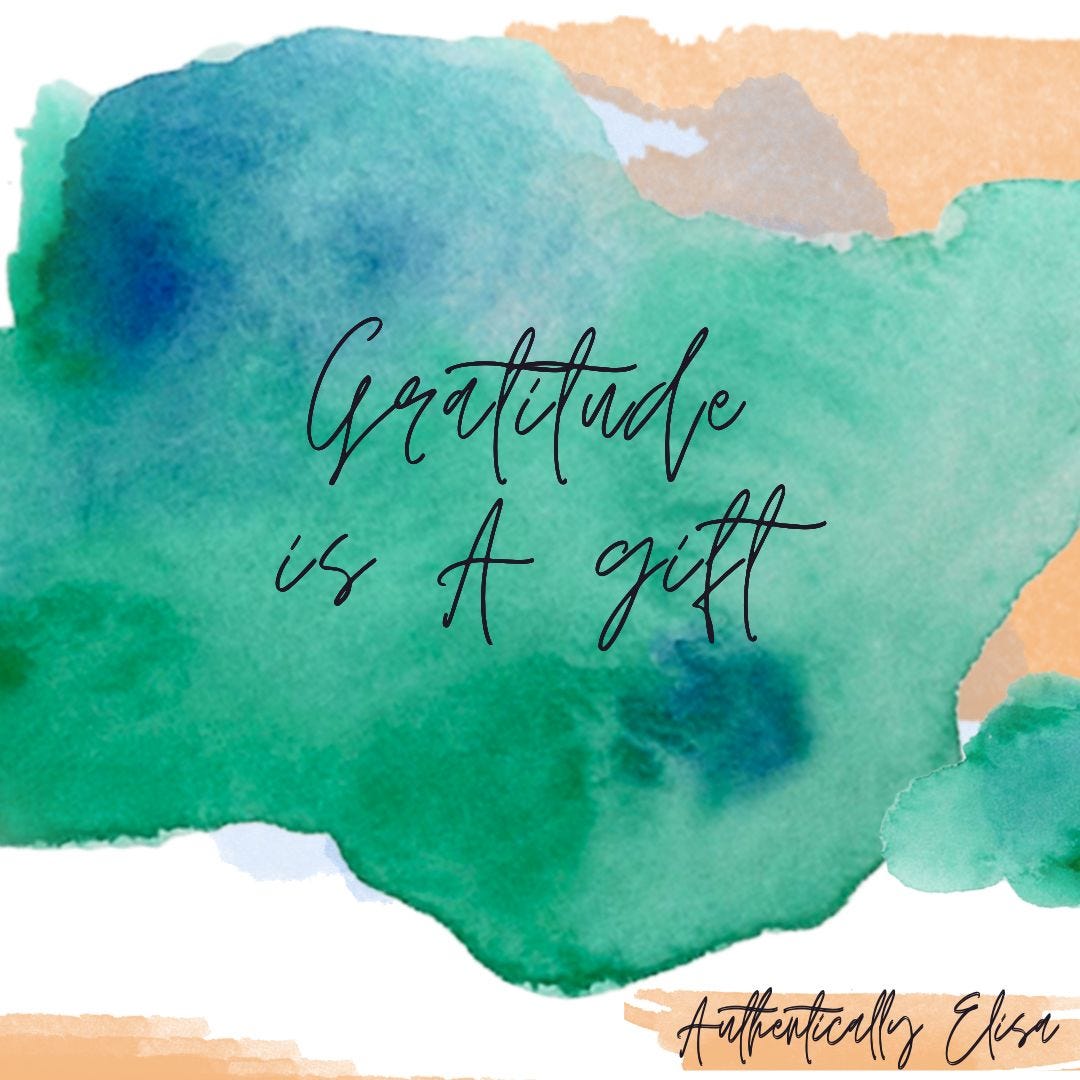Impossibly Possible Gratitude and 100 Words
Systematically confronting stuck points, avoiding pain, the highway in our brains, what I'm like in bed (not that way), and a poetry challenge that is for more than just writers
I am convinced gratitude is a practice that must become as much a part of our beings as the blood that flows through our veins. Remember the emotionally healthy toolbox I wrote about last week? Gratitude is probably my most favorite and my most used tool on it!
I am also convinced that the work of healing must be coupled with a vision for wholeness and the practice of gratitude. Without this, we just might drown in the world’s troubles, our troubles, or even in our own minds.
Systematic confrontation: My personal update
Let me set the stage for you with my personal update. The last few weeks have been intense both emotionally and spiritually for me. I started a new type of therapy—a twelve-week intensive using Cognitive Processing Therapy. (It falls under the umbrella of Cognitive Behavioral Therapy for those familiar with this.)
I believe God has led me to this next step of healing. I was nervous and excited to start. I want to systematically identify the lies I believe that have been born of the last couple years of trauma. Not so I can wallow in them, but so I can expertly track where they have invaded my life. I want to reframe and speak life and truth to myself.
Pain is what pain is
I have to say, it has been hard to not avoid the pain that comes with intentionally doing my assigned homework. As I understand, the pain center of the brain doesn’t really distinguish between emotional and physical pain. At times, I have to remind myself that although I hurt, I am physically okay. Otherwise I start panicking. I find it crazy and weird that just doing this small practice—recognizing I am safe at the moment—is so helpful. When I am hurting I just want the horrible feelings to shut off. Avoidance is all too easy and “suffering well” is something I am still learning.
The CPT method
The first step of CPT was to write out why I thought one of the particular traumas happened. How the heck was I supposed to guess at that? The whole first part of my “why it happened” was me getting philosophical about why we are asking why and what that means. In other words, I was avoiding getting into the actual reasons why I believe what happened might have happened.
After this, we moved onto identifying the lies I believe, or as they call it in psychology, “cognitive distortions” or “stuck points.” I created a five-page long list. My therapist told me that sometimes people only come back with two points, so I was being an overachiever. I figured that if I am going through pain anyway, I might as well go through all of it at once! Oh, and in case I haven’t mentioned it, I really, really want to be free. That’s a pretty worthy vision for wholeness!
Then, for fun, I organized them into themes. Actually, that was a way for me to avoid thinking about them. They hurt. But hey, now my five pages are much easier to refer to and read!
Now I am in the stage of recognizing them all day long. Within the course of an hour this morning, I recognized four triggers (“antecedents”), the things I was thinking/believing about them (“behaviors”), and the emotional response or how they pushed me to act (“consequences”). Later on today I am supposed to go back and determine whether what I am believing is actually true or realistic. Then I find new things to say that are more true and helpful for me to say to myself the next time I am triggered in a similar way.
Whew! If I can identity one every fifteen minutes all day long, and it takes me about that long to process each one—there goes my day. It is exhausting. (Just so you know, I am not going to do this all day, I’d totally drown).
Through the process I am realizing why I so frequently feel like I am crazy and do crazy things. It makes so much sense that I so frequently feel like I am in danger. Or why I am anxious or depressed, if these stuck points are what I really believe under the surface. No wonder life feels so scary, hard, sad, impossible, or I feel shame, unworthy, etc….
Today, I am intimately acquainted with how broken I am and how much more healing I still need. Although I’ve come so far, there is so much further I have to go. It is humbling and a little overwhelming.
But mostly, I am filled with gratitude that I have a direction to move into, support, and I hope to be transformed—in my mind, heart, and body.
Family gratitude
Like I mentioned, I love the tool of gratitude. It is an incredible gift to us. I wanted for it to not just be mine, but for gratitude to belong to my whole family. That isn’t too hard to ask, is it?
The Johnston’s are a thankful people.
These days, in our home, we put our gratitude on our cupboards with sticky notes in the autumn. Words of thankfulness aren’t just in our prayers, but have become part of our dinner table chatter, and are shared in a round while driving to-and-fro. But despite my naïveté that it should have been simple to do, gratitude didn’t take root easily in my household. We’ve gotten a lot better at it, but it took a lot of practice over the course of years, and here’s why.
Is gratitude actually possible?
I’d venture to say many people are generally just fine at being grateful. That is, unless they are anxious, stressed, sad, scared, angry, upset, frustrated—you get the picture. Too often, those things are all the time. Have you met our world, after all? There is a lot of suffering and pain in it!
It makes sense that it is easy to be thankful when we are already happy. That joyful part of our brain is already lit when we are happy. (Not lit like a party, but yes, maybe lit like a party!)
The question isn’t whether we can be grateful or not, but whether we can we find joy, hope, and gratefulness when we are suffering. This is the real test of who we are becoming.
I haven’t always been sure it was possible. The ancient writers thought it was possible—it was even considered the best plan for our lives! The practice of gratitude is a gift! It isn’t something we should achieve, but something we get to move into! (Probably because it helps us so much!)
Always be joyful. Never stop praying. Be thankful in all circumstances, for this is God’s will for you who belong to Christ Jesus. 1 Thessalonians 5:16-18
And although I haven’t experienced every evil, I have suffered a lot and walked with others through their turmoil in a way that greatly affected me. I don’t think I could come back to joy without having practiced these skills on a regular basis before things got really hard in my life over the last few years.
Build a highway in your brain!
The whole reasons we have those practices are to strengthen us. They prepare us to endure and teach us resilience. Go and look it up yourself, but neuroscience has taught us a lot of really cool things about how our brain works. And our goal is to use skills that help our brain create neural paths back to joy that are as huge as ten-lanes of northbound speeding traffic on Interstate 5.
They must be frequently traveled. Gratitude is one way we can help carve these highways in our beautiful, amazing brains.
Everyone likes lists
These days, I practice gratitude in many ways. I thank God as I drive, I marvel at beauty as I walk, I sing, I write something creative, or I go back-and-forth with my family naming what brings us joy.
Even so, at the top of my list is making lists. I love lists. But this isn’t unique to me, I’m pretty sure everyone loves a good list. So it serves us well that one of the most effective ways to practice gratitude is through your run-of-the-mill list. Simply name what you are grateful for and allow those to build upon themselves. It is easier than a magic trick! (Which is actually rather hard, as I have no clue how to do magic tricks.)
I’m going to do it now to show you how, unrefined, with whatever comes up:
9.28.2023
I am thankful for…
This coffee drink
For Robbie watching my baby so I can be here and write
That my daughter and I have been getting along better this week
For that x-rated moment (I’ll spare you, reader)
That I get to see my cousin!
That I get to help in little ways with the refugees this week
Jen O.’s refreshing enthusiasm in that!
That my body isn’t aching a lot during the daytime
That I have a method to address this overwhelming influx of not-exactly-true beliefs
Oh, that even though it often feels like I should, I don’t have to prove my worth! That is incredible!
That the Mentorship Circle seems to be meeting a need and for those friends
That I get to see Bernice this weekend
That Meg is still part of our family
That I can afford to buy food and gas at Costco today
That I can go outside and live in San Diego!
(And it keeps going…)
If I just start off with listing five to ten things before and after addressing hard emotions (like what I am doing in CPT), oh does it help! It keeps those pathways I’ve developed over the years strong, wide, and clear of debris.
What I'm like in bed (not that way)
Those moments of partial wakefulness before the day, where birds are chirping, kids are banging and workmen outside are shouting is an excellent time to practice coming back to joy through gratitude. It is the same at night—these times of partial wakefulness are cues to whether we are developing this mindset of gratitude.
Anxiety and then, trauma, have made sleeping a challenge for me over the years. Not only did insomnia frequently take hold (read here), but frequently I have to talk myself into falling asleep, wanting to avoid it and the panicky feeling of when I am about to lose control.
In the morning, I often also struggle. I rarely want to leave the bed, often overwhelmed by sadness, pushing away reality, and feeling like life is too much to face. You can consistently find me pulling my blankets over my head, once again, hoping to avoid. Here, my prayers quickly turn into begging for God’s help. It is an intimate safe space for me to be authentic with him. I ask God to meet me there, under my soft duvet. And He does. The Comforter comforts me under my comforter. (Oh my gosh—that was such a horrible pun. You are so welcome!)
At these times, both in the morning and the night, are when I push into gratitude. It helps that I have four pillows that tuck around me to help reduce joint-pain—this is usually my starting point on my gratitude list! If I can’t move into listing what I am thankful for, I try to refocus on telling myself stories, usually reviewing happy memories with loved ones.
Doing all of this has helped me a lot.
Years ago when my anxiety was really bad, I pushed into gratitude in the waking and falling asleep moments. Over time, I found myself almost always able to “return to joy” (as my cousin calls it).
When injustice in the world becomes overwhelming, when things I’m leading in aren’t going well, or when the weight of pastoring others through hard stuff becomes wearisome, I don’t have to stay in only those emotions. At night these things always feel especially weighty, and yet gratitude is always ready to lighten the load.
And now, a full six-months after my last medical crisis, following those couple years of trauma, I am seeing my ability to sleep return as I keep practicing my gratitude exercises.
One morning not too long ago, when doing this praying/thankfulness thing while waking up, I found myself mulling over the phrase “one-hundred words.” Inspired by the book of Psalms (happy and angsty poetry written to God) I sat up, determined to write my own psalm of poetry in exactly one-hundred words.
One-Hundred Words
One hundred words singing your praise,
Here's my compilation of adoration!
How can I love one so immense?
And trust in you,
So mysteriously unseen?
Why am I awed by the changing sky and the wind-blown trees?
On the mountain,
I stand soaring, confident and convinced of your faithfulness.
On the shores,
My toes bury at the precipice of crashing waves,
The power so intense they could swallow me up.
Yet I rest in peace,
Trusting the boundaries of Greatness.
I am compelled
To put together a hundred words
Declaring my desire and commitment to you,
O Giver of Life!
You might be surprised—I totally was—to learn that my first draft was exactly 98 words. I was pretty proud of myself for being so close! Of course, then the editor in me kicked in and spent the next half-hour editing two words in and around a poem that took less than five minutes to write. (I am pretty sure this is the writer’s curse, it always takes sixteen times longer to edit what you write than it takes to actually write it!)
_____ is full of gratitude. a thankful person.
I assume it is obvious that I have a purpose in sharing my own story of personal challenges. I wrote out how I return to joy through thankfulness because I hope you will be able to imitate this in your own life. I want you to be inspired and equipped. I invite you to do all of the things I do and more to practice gratitude in your life!
Let this be true of you: __(your name)__ is a thankful person.
Share with me in the comments other ways you practice gratitude, on your own, with your family, or with your community. How has it changed your life? How do you dream gratitude will change your life?
What are your one-hundred words?
I also hope a few of you will join me in trying your hand at writing your own psalm or poem of gratitude. It can be faith filled, like mine, or it can be basic plain ol’ happiness just because there is tree by your house.
Either way, I am inviting you to write one! Can you write something that taps into thankfulness in exactly one-hundred words?
If you want to take up the challenge, please share your one-hundred word poem with me in an email, in the comments, tag me on Instagram or Facebook, or send me the link to it on your own platform. I’d love to see it! Then, if you allow me, I’ll share it! Or at least as many as I feel comfortable sharing without spamming everyone else. I haven’t yet determined if I will add one to the end of each of my posts throughout the fall, or over time I’ll make a few compilations of these.
But you have to write one first! Are you ready to give it a try?
*Note: Because it has to be said, as the editor of Authentically Elisa, I will still use discretion on what is appropriate for this space. I reserve the right to deny publishing any poems and will only share one poem per person. In addition, this opportunity is only for those part of this small community of readers. By that I mean they’re either a free or paying subscriber of this blog.*
In conclusion…
Friend, thank you as always for listening to me share about things that are dear to my heart. I hope this invitation into gratitude becomes a game changer for you, like it has been for me. We don’t have to drown in our healing, or just in our everyday life, when we have good gifts like these!
Part One of the Wellbeing Series here: The Emotionally Healthy Toolbox
Follow me on Instagram here @AuthenticallyElisa.
On Average Advocate this week: Helping Asylum Seekers in San Diego (IG or Facebook)








